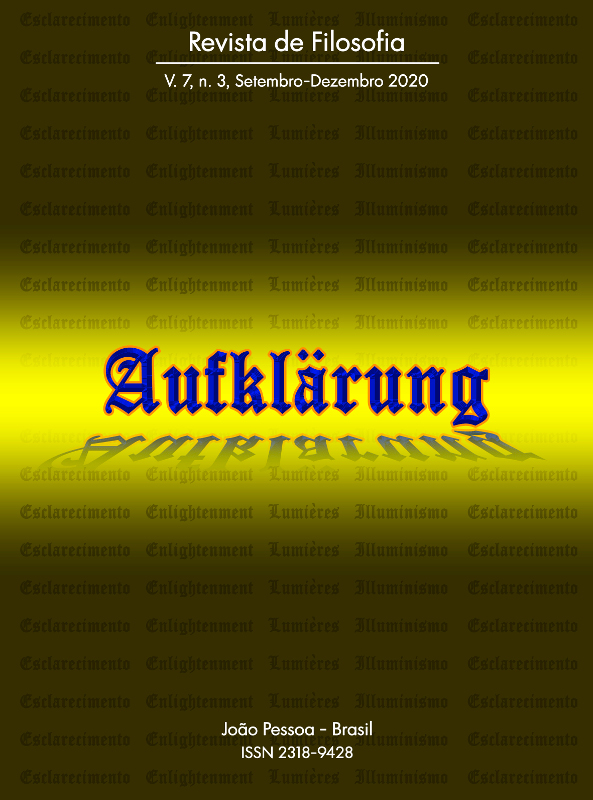The genesis of the intuition of the otherness and the formation of the transcendental community: the question of intersubjectivity in Husse
DOI:
https://doi.org/10.18012/arf.v7i3.53823Keywords:
Phenomenology, Self, Other, Solipsism, IntersubjectivityAbstract
This article aims to examine the genesis of the intuition of the other and how the formation of the transcendental community occurs, that is, to investigate the issue of intersubjectivity in Husserl. Phenomenology evokes the primacy of eidetic study, taking essences to the highest level of purity intentionally. In the phenomenological reductive system, the ego can rigorously explain itself and reveal to itself its structure of the possibility of knowledge. It is shown that, Husserl, in order not to fall into solipsism, adopts a new perspective of approach to the reductive system (abstract epoché), which allows identifying the transcendental structures of the relations with other subjects. It is evident that, when intending the other, in the transcendental perspective, the self is faced with a pure structure of connection, which allows it to constitute a common world, that is, the sense of collectivity. Therefore, phenomenology, now provides, from new bases, the constitution of the transcendental self and its concrete reality, as a monad, and when describing the issue of intersubjectivity, as a community of subjects, as the foundation of transcendence, it emancipates itself from solipsism and complete the reductive system.
Downloads
References
DARTINGUES, André. O que é a Fenomenologia? 9ª ed. São Paulo: Centauro, 2007.
DEPRAZ, Natalie. Compreender Husserl. Petrópoles: Vozes, 2007.
DESCARTES, René. Meditações metafísicas. São Paulo: Abril Cultural, 1998.
FRAGATA, Júlio. A Fenomenologia de Husserl como fundamento da Filosofia. Braga: Livraria Cruz, 1959.
HUSSERL, Edmund. Conferências de Paris. Lisboa: Edições 70, 1992.
HUSSERL, Edmund. Investigações lógicas. Sexta investigação: elementos de uma elucidação fenomenológica do conhecimento. São Paulo: Nova Cultural, 1988.
HUSSERL, Edmund. La Filosofia como ciencia estricta. Buenos Aires: ALMAGESTO, 1992.
HUSSERL, Edmund. Lições para uma fenomenologia da consciência interna do tempo. Lisboa: Imprensa Nacional, 1994.
HUSSERL, Edmund. Problemas fundamentales de la Fenomenología. Madri: Alianza Editorial, 1994.
HUSSERL, Edmund. La crisis de las Ciencias Europeias y la Fenomenologia transcendental. Buenos Aires: Prometeo Libros, 2008.
HUSSERL, Edmund. A idéia da fenomenologia. Lisboa: Edições 70, 1986.
HUSSERL, Edmund. A Crise da humanidade européia e a Filosofia. Porto Alegre: EDIPUCRS, 1996.
HUSSERL, Edmund. Meditações Cartesianas: introdução à Fenomenologia. 2 ed. Porto: Rés, 2001.
HUSSERL, Edmund. Idéias para uma Fenomenologia Pura e para uma Filosofia Fenomenológica. Aparecida: Idéias e Letras, 2006.
PIZZI, Jovino. O mundo da vida: Husserl e Habermas. Ijuí: Editora Unijuí, 2006.
PELIZZOLI, Marcelo Luiz. A relação ao outro em Husserl e Levinas. Porto Alegre: EDIPUCRS, 1994.
RICOEUR, Paul. Na Escola da Fenomenologia. Petrópolis: Vozes, 2009.
SOKOLOWSKI, Robert. Introdução à Fenomenologia. São Paulo: Loyola, 2004.
ZITKOSKI, Jaime José. O método fenomenológico de Husserl. Porto Alegre: EDIPUCRS, 1994.
LÉVINAS, Emmanuel. Descobrindo a existência com Husserl e Heidegger. Trad. Fernanda Oliveira. Lisboa: Piaget, 1999.
PELIZZOLI, Marcelo Luiz. Entre o Mesmo e o Outro. A reconstrução da subjetividade pelo sentido ético da alteridade: Husserl, Heidegger e Levinas. Porto Alegre: Tese de Doutorado em Filosofia - PUCRS, 2000.
SAN MARTÍN, Javier. La estructura del método fenomenológico. Madri: UNED, 1986.
STEIN, Ernildo. Mundo vivido: das vicissitudes e dos usos de um conceito da fenomenologia. Porto Alegre: EDIPUCRS, 2004.
Additional Files
Published
How to Cite
Issue
Section
License
Journal general policy
1.This journal works under a Creative Commons License aplied to online journals. That icence can be read in the following link: Creative Commons Attribution 4.0 International (CC BY 4.0).
2.Accordingly to this License, a)the journal declares that authors hold the copyright of their articles without restrictions, and they can archieve them as post-print elsewhere. b)the journal allow the author(s) to retain publishing rights without restrictions.
Metadata Policy for information describing items in the repository
1. Anyone may access the metadata free of charge at anytime.
2.The metadata may be re-used in any medium without prior permission, even commercial purposes provided the OAI Identifier or a link to the original metadata record are given, under the terms of a CC BY license refered for the Journal.







































